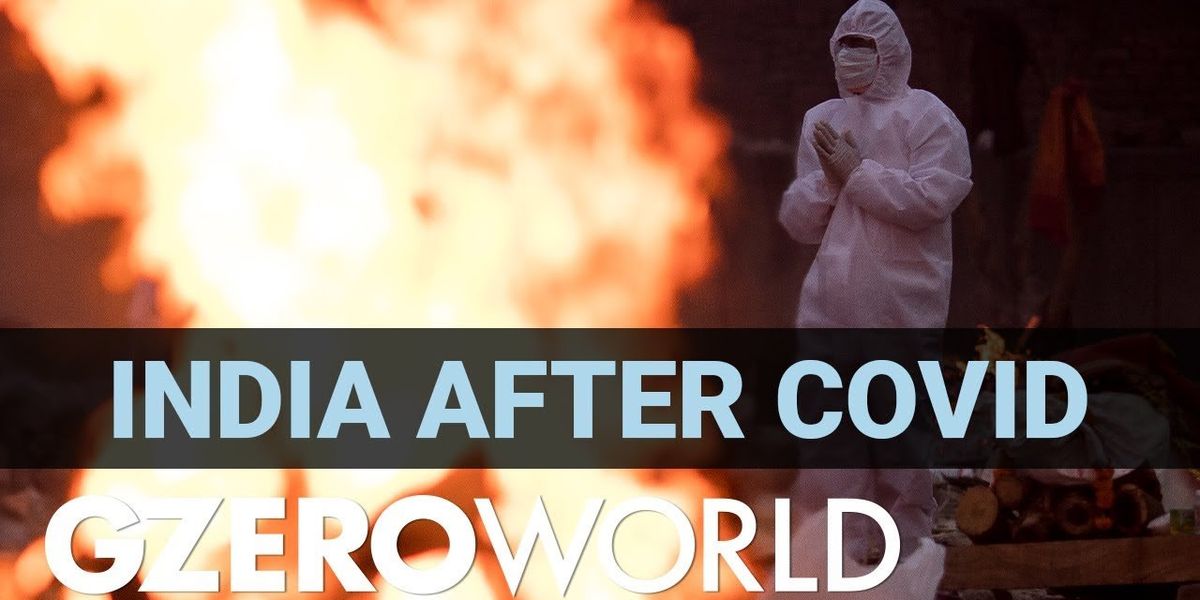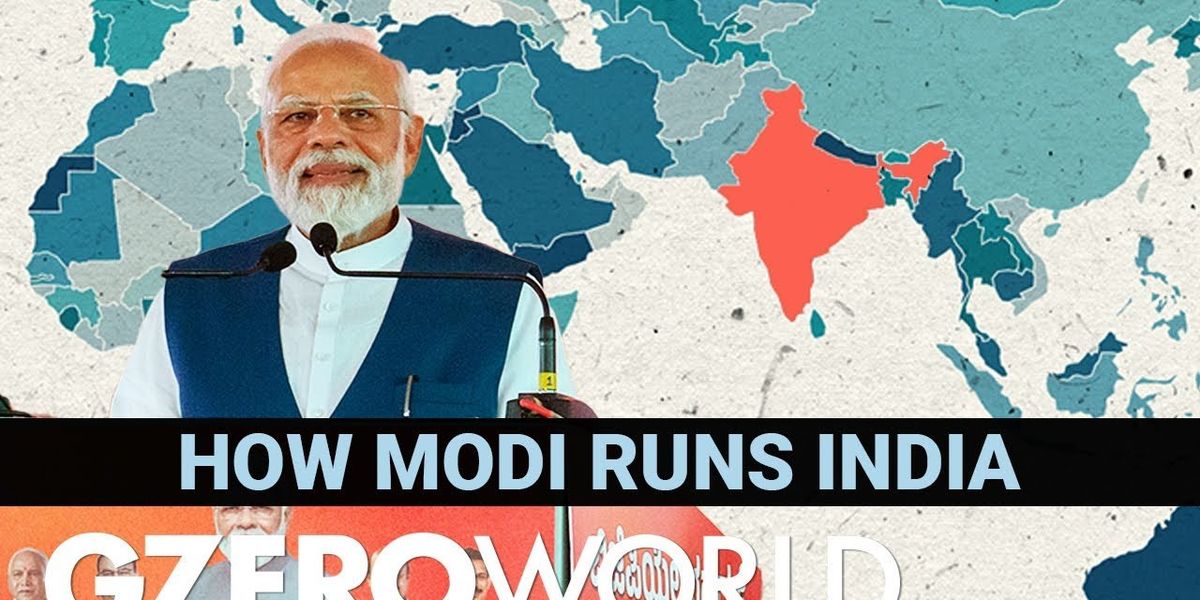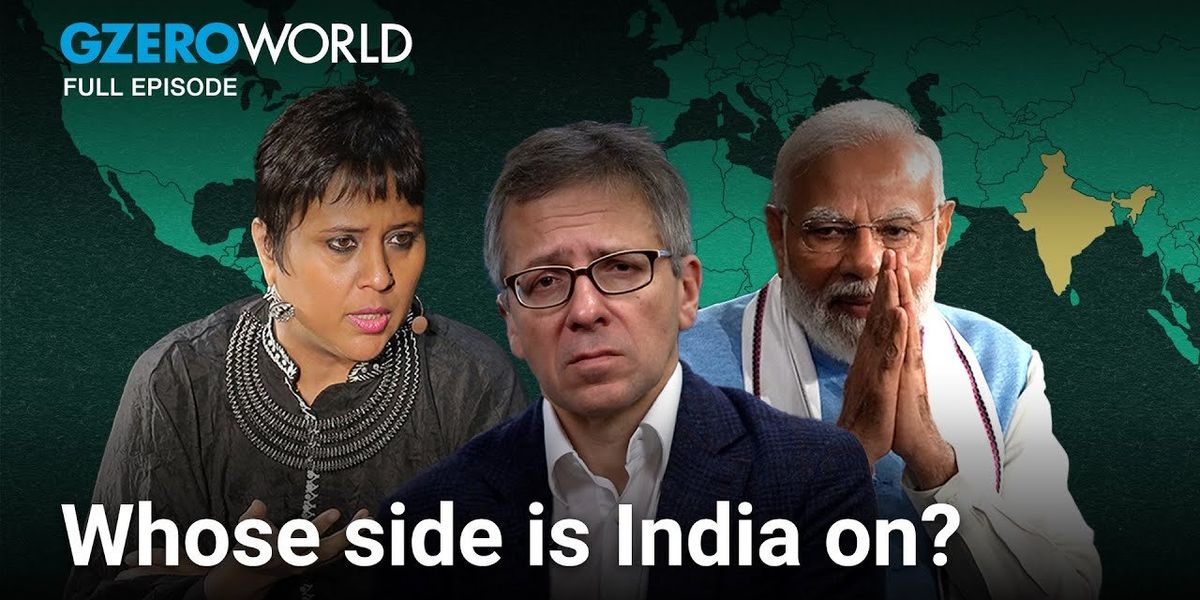Trending Now
We have updated our Privacy Policy and Terms of Use for Eurasia Group and its affiliates, including GZERO Media, to clarify the types of data we collect, how we collect it, how we use data and with whom we share data. By using our website you consent to our Terms and Conditions and Privacy Policy, including the transfer of your personal data to the United States from your country of residence, and our use of cookies described in our Cookie Policy.
{{ subpage.title }}
India after COVID
Few nations were as ravaged by COVID as India, especially when the Delta strain tore through the country in the spring of 2021. Delhi-based journalist Barkha Dutt experienced its toll as both a journalist and a daughter. Back when she first appeared on GZERO World in May 2021, she had just lost her father to COVID. She was simultaneously grieving and covering COVID's impact across India.
Two years later, Ian welcomes Dutt back on the show to discuss a wide range of US-India issues, but also to check in with her on how the trauma of COVID has changed her life, as well as the direction it has taken her country, two years later.
"It's been, personally, a very, very painful time, and professionally, ironically, some of my best work, and to reconcile that is quite a difficult thing to do, emotionally."
Tune in to “GZERO World with Ian Bremmer” on US public television to watch the full interview. Check local listings.
What does democracy look like in Modi's India?
India's population recently surpassed China's and in the most populous country on earth, nothing is simple. But for the world's largest democracy, democracy isn't so simple, either. India has had its fair share of problems, from the persecution of minority groups, to a clamping down on press freedom, and India's Prime Minister Narendra Modi has faced stiff criticism from the West. But during his recent trip to the White House, President Biden still rolled out the red carpet and welcomed him with open arms. The question remains: What does a Modi led India look like?
Our guest this week is award-winning broadcast journalist and Washington Post columnist Barkha Dutt, who has a message for both DC and Delhi: "For the critics in America, let India battle this out. It'll probably be more productive. Don't be judgy. Talk to us as an equal. For the Modi government, you can't hide from this question. You need to start engaging with it. It's a real question, and you have to engage with the criticism that is brought to your door on this question."
Tune in to “GZERO World with Ian Bremmer” on US public television to watch the full interview. Check local listings.
Is Modi's India a friend or foe to the US?
What is an ally? How is it different from a strategic partner? At what point does a shared interest between two nations bloom into a full-fledged alliance? Those questions are at the heart of the DC-Delhi relationship.
So, is India a US ally? Based on the pomp and circumstance surrounding Indian Prime Minister Narendra Modi’s state visit to Washington in June, the answer seems obvious, right? They love us! We love them! End of story. Right?
Ian's guest today, award-winning Indian journalist and Washington Post columnist Barkha Dutt, has some tough love to share: Sorry America, India will never be your ally. "India's hardwired from inception, as an independent country," Dutt tells Bremmer, "to be what what used to be called non-aligned, and what India's foreign minister now calls multi-lateralism ... India is asserting her moment in time."
On the other hand, both nations share a common interest in countering a rising China. So how does Dutt square that circle? Tune in to “GZERO World with Ian Bremmer” on US public television starting this Friday, July 7, to watch the full interview. Check local listings.
India is not a US ally ... or is it?
If the United States and India were ever to make it Facebook official, their status would be: "It's Complicated." These two global behemoths may seem like close allies, especially judging by the warm welcome President Biden gave Prime Minister Modi during his White House visit in June, but in reality, they are anything but best friends.
During the Cold War era, India maintained a "strategically non-aligned" global status and it has tried to stay on the geopolitical fence since fall of the Soviet Union. But when Russia invaded Ukraine and Delhi refused to explicitly condemn Moscow, India's self-proclaimed "multilateral" approach was severely tested.
On the show this week, a deep dive into the nation that recently surpassed China to become the most populous country on earth. Ian is joined by award-winning broadcast journalist and Washington Post contributor Barkha Dutt to talk US-India relations, the state of democracy within India, and how the trauma of COVID has reshaped the country.
Tune in to “GZERO World with Ian Bremmer” on US public television starting this Friday, July 7, to watch the full interview. Check local listings.
Podcast: Modi's India on the world stage
Listen: Is India a US ally? Based on the pomp and circumstance surrounding Indian Prime Minister Narendra Modi’s state visit to Washington in June, the answer seems obvious, right? They love us! We love them! End of story. Right?
Well ... it’s complicated.
India’s government is not ready to hitch its star to the American wagon, and the US has made it somewhat clear that it’s not a fan of India’s friendly ties to Russia and Iran. Add to that increasing international scrutiny of India’s eroding democratic norms, press freedom crackdowns, and religious persecutions, and the question becomes murkier still: Is India a US ally.
Ian's guest this week will do her best to answer that question and more. Barkha Dutt is an award-winning Indian broadcast journalist with more than two decades of reporting experienceSubscribe to the GZERO World Podcast on Apple Podcasts, Spotify, Stitcher, or your preferred podcast platform, to receive new episodes as soon as they're published.As India gasps for air, a government “still in denial”
According to Delhi-based journalist Barkha Dutt, while the Indian government has finally started to mobilize in response to the COVID crisis, there's still a lot of denial about the severity of the ourbreak. "Our Health Minister, for instance, made a statement in the last 24 hours saying that India is better equipped to fight COVID in 2021 than in 2020. That's simply rubbish. We had India's Solicitor General telling the Supreme Court that there is no oxygen deficit as of now. That's simply not true." In an interview on GZERO World, Dutt tells Ian Bremmer that only the connection between fellow Indians, helping each other when the government cannot, has been a salve.
Watch the episode: India's COVID calamity
India’s “Darwinian” COVID response: “Indians have been left to fend for themselves”
"It feels like citizens have been left to fend for themselves. It's almost sort of Darwinian. You have a sense of starring in your own worst science fiction survivor movie, where it's up to you if you survive," says Barkha Dutt, an Indian journalist who just lost her father to COVID and has tested positive for the virus herself. A year into the pandemic, India's government has not properly prepared its hospitals and health care workers, forcing desperate families to run from hospital to hospital looking for help, she tells Ian Bremmer in an interview on GZERO World.
Watch the episode: India's COVID calamity
Did “complacency” cause India’s COVID explosion?
In January 2021, after India got its vaccination program underway, Prime Minister Narendra Modi declared victory over "controlling corona" at the World Economic Forum. But within weeks, those words would come back to haunt him. Ian Bremmer asks Delhi-based journalist Barkha Dutt what she thinks went wrong. "I think the complacency set in because, as a percentage of infections, the fatalities seemed to be not as high as the rest of the world… but it doesn't explain to me why we should've got lulled into not needing contingencies." Their discussion about India's COVID crisis is featured on an episode of GZERO World, airing on US public television.
Watch the episode: India's COVID calamity






